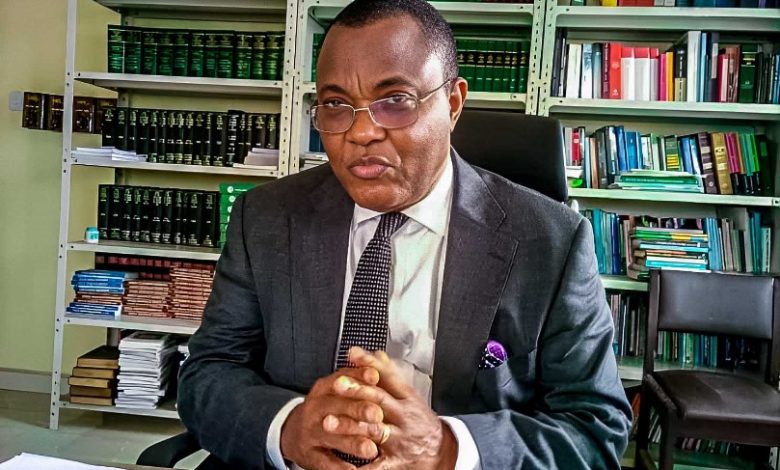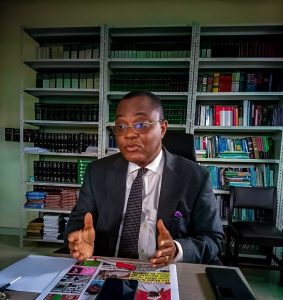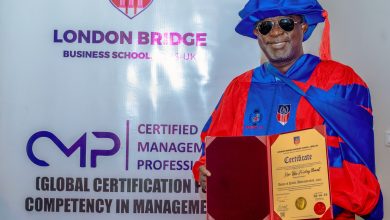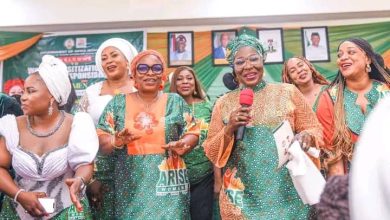
Suave and intelligent, Professor Enefiok E. Essien is a former vice-chancellor of the University of Uyo in Akwa Ibom State – 2015-2020. The renowned scholar is a professor of law with specialisation in commercial law, land law, law of the sea, international humanitarian law and secured credit transactions law. He served as Dean of Deans and Chairman of the Committee of Deans at the University of Uyo from 2012 to 2015.
Prof. Essien has been a Commonwealth Study Fellow, President of the Society for International Humanitarian Law Teachers in Nigeria, member of the Governing Council of Legal Education in Nigeria, member of the Governing Board of the Institute of Advanced Legal Studies and a member of many professional bodies.
In his honour as a living legend, one out of the four Student chambers in the Law Faculty of the University of Uyo is named Prof Enefiok Essien Chambers (PEEC) in appreciation of his outstanding administrative and academic inputs in the institution and beyond.
The egghead in this broad interview with editors of Crystal Express, speaks on Nigeria’s democracy – the 26 years of uninterrupted run of civil rule and its impact on the nation. Hear him, “A few pitfalls here and there, which is not unexpected; you don’t expect it to be smooth, a smooth ride all through, but it has not been a terribly bumpy ride. I think we have fared the better for it. We’ve recorded successes that we can look back and say, yes, we’ve done well”. Read on!
Excerpts:
June 12 Democracy Day is here again. How have we fared as a nation for the 26 years of uninterrupted civil rule?
Unequivocally, I think one can say that democracy has fared well in Nigeria. Could it have fared better? Of course, yes, but so far, it has fared well. Quite a lot of things have happened since 1999, when we commenced the current democratic dispensation. I think we have been able to weather the storm as Nigerians, and no matter how you look at it I think one has to concede that we have fared well.
There are a few pitfalls here and there, which is not unexpected; you don’t expect it to be smooth (a smooth ride) all through, but it has not been a very terrible bumpy ride. I think we have fared the better for it. We’ve recorded successes that we can look back and say, yes, we’ve done well.
We have made lots of improvements in the development of the country and across the states. In evaluating our democracy, the three arms of government – the executive, the legislature and the judiciary – are doing very well. They are complementing one another. One may have criticisms here and there, but it is not totally unexpected. However, the applause is much more than the criticisms. So yes, 26 years later, I can say that we’ve done well, and I’m sure we could do better.
Comparatively, it has been difficult to carry out the creation of state and local governments as was done during the military era. Why are we finding it difficult to do so under democracy?
Well, under military rule, things are done by fiat. Things are done with immediacy. Whether you like it or not, things come to be. And that is the very opposite of our democracy. Of course, states are a lot more easily created under military rule, ditto for local governments. But you have to look at those states created under the military rule. Are the boundaries satisfactory? Because in civil rule, under democratic governance, when you want to have the creation of states, there must be a consensus by the indigenes of the desired states; they have to agree that we belong here, we belong there. And when you do that, it means that you have carried the people along in the process of creating the states. But in a military rule, people are not really carried along. Boundaries are arbitrarily set. And that’s reminiscent of what happened under colonialism, where you have countries being arbitrarily demarcated. You may have people speaking one language, but split into two different countries, so that’s done by fiat. That’s against their will.
So you have to be rational in comparing democratic rule and military rule.
Don’t jump into applauding the military rule for its urgency and immediacy. I think, in doing that, you have to hurry slowly into praising them. You have to see that everything has its own pros and cons. When you compare both institutions, the difference will be seen. I think we should know that military rule is not as good as democratic rule. And as it is often said, the worst form of democratic rule is better than the best form of military rule. And that’s because, when you look at state creation, look at local governments’ creation, and why it is delayed under civil rule is that it is created by the people and not by supervening authorities that have more power than all others and just decree it and it comes to be. But under democratic dispensation, the people have to agree. And if you want the people to agree and you want to have a consensus, then there must be discussions and agreements, and that will cause delay. So that’s why you may see what looks like delay in democratic rule.
Looking at our governance structure at the national level where we have two legislative bodies with so many members and with operating cost that eats deep into the coffers of the nation, is it still advisable to run this kind of a national assembly with Senate and House of Representatives?
When you look at the Senate and House of Representatives, the two of them making up the National Assembly, we have to also know that we are borrowing it from the American system, and if you are borrowing, you borrow as it is, unless you want to borrow half and leave half. But whatever the system, it must be carefully thought out. If you want to look at parliamentary system for instance, where the leader comes from the parliament, elected by parliament and he is a member of parliament, it also has its own drawbacks. And like Britain for instance, they have a monarchical system where the King or Queen is there by birthright and is the overall head. And then you have parliament. You have the Prime Minister. You have ministers being members of Parliament (MPs). But if you look at that system and look at our own, you will see the difference that ours is presidential system. What we have in Nigeria is typical of a presidential system and not parliamentary.

Of course, something may still be said about our presidential system; perhaps that in ours the members of parliament could be part-time. If you look at the number of sitting days and their inputs into the system, then we can appraise the system. How many hours do they give to the National Assembly and the amount of work that they are doing? What productivity? And you may even have some of them that are not even as productive as others, but are still earning the same remuneration. So perhaps we may decide to say, okay, because Nigerian presidential system is the most expensive, let’s lessen the expenses, and let’s start to think of how we can make it less expensive.
However, the presidential system itself, for me, is something to be carried along, some-thing to be continued with. But look at the expenses involved in its operation, look at the remuneration. Is the work done commensurate with the remuneration given? Is it more pay for less work? What is the quantum of the work done? Can it be done as part-time? Is it possible? We should be able to give thoughts to this so that that will also make it more of service to the people, and less of the personal reward that people look for. If you look at the way people fight for positions in the National Assembly, then you’ll know that the cut-throat struggle to be there; maybe is because of the remuneration. So to reduce that and ensure that the very best gets there, we have to consider maybe making it apart-time job. That will mean members will have time to do other things. One can look at the budget and the money allocated to members; can’t it be put to alternative use? I don’t want to say better, I use alternative. Can it be put to some other use?
When we further streamline, it may reduce the number of those who aspire to these offices without commensurate potentials to put in, commensurate work to give. You know, there are 1001 people who are very qualified to be there in the National Assembly, to give more service, but they cannot be there because the reward system is so high that those who will be able to be there are the moneybags. And if you are moneybags and you get there, of course, you want to have more money, because money is very addictive. Yes, the more you have, the more you want. And that’s why billionaires are still working very hard to make more billions, because they want to be at the top league. They don’t want to be overtaken in the race for wealth. So that’s why I think we can look at how to balance it.
Your response to the last question borders on review of the Constitution. As a legal luminary, what are the defects in the 1999 Nigerian Constitution, because many have repeatedly called for its review on several occasions?
It’s one thing to see areas for review in the Nigerian Constitution, and it’s another thing entirely to actually carry out the review, because when you get to the National Assembly, the dynamics in the assembly itself, in terms of the voting power, in terms of the numerical strength, the areas you want reviewed, some people may not want those reviews in those areas, and that will make it very difficult. That is part of the system about democracy, it is not military rule. You know, the 1999 Nigerian Constitution we have now was given to us by military rule. And so the sections we have, even the first section, “We the people,” the preamble, states that ‘We the people.” Is it the people who actually gave this constitution? So that is the point. But it was a military rule, like we said earlier. They can just give you a law by fiat And you know people were hungry for democracy. So anything that was given, people took it We didn’t have a choice. So when you are given that, you say, oh, we are happy. We are going into democracy. You won’t look at the nitty-gritty, until when you start to practise it So the areas for review in the Constitution are many. For instance, I think if we have away, we should go back to a system where each region will govern itself, so that you will be able to galvanize the resources of your area. You’ll be able to prioritize your needs. Look at the same system that we have now in the states because each state is more or less governing itself Each governor of each state now is able to bring his ingenuity, his creativity to bear, and that’s why you see some states being more developed than others at a higher pace. That is even now that you have a lot of money at the state level, be-cause of the removal of fuel subsidy and all that which has given more money now to the states, more money to local governments. Some states are using the money received and generated, more properly than others.
That’s why in this state Akwa Ibom, for in-stance, without being comparative, you can see that in the last two years of this administration, the government has done almost more than some states and governors have done in four years. In the first two years, the government of this state Akwa Ibom, has done more than some states have done in four years. If you look at the life-touching projects, at the local governments, at the individual levels, like the Compassionate Homes and the impacts are touching people directly. And then even look at the macro level; if you want to say legacy projects, you see the extent that has been done in very many areas. Projects like the 200-bedroom Ibom Hotel that is now going to be completed, and the 5,000-capacity thorn Conference Centre at the Tropicana Entertainment Conference Centre, Uyo.
The last bar meeting of the Nigerian Bar Association (NBA) was to be held in Port Harcourt, Rivers State, but because of the political issues that engulfed the state, it couldn’t be held there again. The NBA leadership was looking for a way to hold it. Our state Akwa Ibom, was one of the states, in fact, the first state that was thought about, because by God’s grace we have access by land, by air and by sea in all the areas of transportation. So this state was the first state that the NBA thought about for the hosting of that event but there were not enough hotels to accommodate the huge number of guests expected, and there was no sizable conference centre where the events could be hosted. And they were forced to go to Enugu because of a new conference centre that the governor there has built But now, we are starting our own and in a record time, it will be completed. So these are legacy projects in the first two years of this Governor Umo Bassey Enos administration, and we are thinking that if this happens in the first two years, then the second two years, even though we know that those will be election years, but it will not stop development in this state. The reason for that optimism is that Governor Umo Eno, PhD, has been adopted by all parties. Yes, he has been adopted by all the political parties, and so he will not have much or any distraction. So we expect that even the next two years, starting now, he will still be continuing with the pace of development.
So I think if we are to look at it as the Constitution has given leeway to states, same should be given to regions to develop at their own pace. Instead of thinking that everybody should go at the same pace as in the present structure. It’s not right. So I think we have need for amendment And that was even the genesis of federal character. The idea was that you give access to states that are not as qualified. So that would mean that you hold back this one to put the other one. So those things are in the constitution as well, like the federal character.
You’ve just talked about the parties adopting the governor for a second term. Do you think it enhances or diminishes democracy because that means there may be no competition, that means even the majority of the people may have no choke than to just follow what a few people in the parties have done? Is it really healthy for our democracy?
I do not think it is a matter of few people in the party having done it I will not think so In fact, I would go forward to say that it is not so. Rather, the truth is that if he’s adopted, the people have adopted him, because I know that avenues are being given to the people to express their views. And incidentally, it is some-thing one should applaud. You see, unlike what happens in maybe one or two places where you have defection into APC, in this case, the approach of the governor is very methodical, very strategic.
Governor Umo Eno, PhD, goes to the people. He allows people to buy in. He gives them the chance to say their views. He wants to hear from them. Do they agree? Do they disagree that he wants to do this? He’s even making his intention known before he does it It’s not a matter of you waking up one day and you hear that he has decamped, he has left, or you see a press release on it No, he is very methodical, very strategic. He carries people along so that nobody is taken by surprise. He makes, he keeps his card face up on the table, by going to the people, telling them, look, this is what I want to do. What is their view; is there any objection? He does that prior to when he will formally declare. So, I don’t think it’s a matter of some people just carrying him, agreeing that he should defect No, it’s not so. So to that extent, it is democratic. It is good for our democracy, to answer your question.
Yes, he carries the people along. So more or less, the people are the ones doing it. He said look, you gave me mandate to go under this party. Now, I would like to now go under that party. Do you agree? The people now will give him the mandate. So it is still power in the people. It still resides in the people.
Related: A’Ibom Is Blessed To Have Pastor Eno As Governor – Ntuk Udeh
Nigeria has 36 states, but has over 40 ministers, with some as ministers of states. In your own view, looking at the fact that Nigeria is not really a rich nation as we borrow a lot to service our economy as we are import-dependant. Will you say it is still healthy to have such number of offices more than the number of states?
That is a matter of style. It depends on the man at the head. It’s a matter of style, because, like you said, if you have more ministers than the number of states, if you choose ministers from each state and you have more ministers than the number of states; it’s a matter of style. It’s not a matter of constitution. It’s not a matter of compulsion; it’s a matter of discretion. Discretion can be exercised in many ways. It may be whimsical, it maybe arbitrary, it may be judicious. Yes, it can be exercised in many ways, so, it’s his discretion. The President considers what is good. How is it? How should it be done? It may be that after going through each state, he now sees those who were pivotal in his emergence and he wants to compensate. So it’s a matter of discretion.
…Notwithstanding the economic implications?
No, when you say economic implications, even the borrowing that you said. Do you know that even borrowing is a matter of how you think? There are people who will be able to think something out, borrow but not much. There are those who will be able to repay what has been borrowed, like this our governor, for instance, if I have to come back home to Akwa thorn State – he has not borrowed. Yes, he’s not borrowed but look at what he has done, even the aircraft he has bought for Ihom Air, other projects executed, ongoing and all that, but nothing has been borrowed. But when he came, he met a huge debt. That’s why it may depend on who is there so that even when you say, we are import-dependent, we are this, you may still borrow. But what do you think you should borrow money for? What you think he should borrow money for will not be what he thinks he should borrow for. You know what I mean; it may depend on who is there, the priority given to that project. So borrowing itself is not an index of poverty. Borrowing does not mean that you are poor. Yes, so don’t say Nigeria is not a rich nation because it is borrowing. Borrowing does not mean that you are poor.
As a matter of fact, those who borrow are rich. It is rich people who borrow, not poor people, because to borrow, you must be able to have security for the debt. You must be able to have guarantee, sovereign guarantee. You must be able to make the creditor know that you have something you can rely on, that you have the capacity. But if you are poor, you want to borrow, nobody will give you. So borrowing is even an index of wealth rather than poverty. In many cases, I have to add that, not in every case.
Let’s discuss education. You are a teacher and an administrator. There have been concerns about our educational system, and recently, JAMB and WAEC gave us more reasons to complain about the educational system in Nigeria. As a participant and an insider, what are those lapses and how do we go about having the desired educational system in Nigeria?
To have a desired educational system in Nigeria, we need to give due emphasis to education. We need to realize that as I sit and talk now, I wouldn’t be doing that without being educated. As you interview me, we will not be doing that without being educated. We need to realize that each and every person you see on the street, you see in the offices, will not be who they are without education. So education is pivotal, it is key. And if you know that, then you must give it the right of place, even in the budget, education must be given right of place in all the things we do. As often said, ‘My people perish for lack of knowledge’. Lack of knowledge is lack of education. So, if government gives proper emphasis, due emphasis to education; education will improve because enough money will be budgeted for education, not only being budgeted, but what is budgeted will be released.
And then, of course, there should be super-vision, because power corrupts and absolute power corrupts absolutely. So when you disburse this money, there should be a check and balance to ensure that money is judiciously used for the purpose intended. So that way, you now discover that you have facilities, proper buildings. You have classrooms equipped. You have laboratories. You have libraries; you have workshops, functional ICT centres, all the things we need including money for research. Research centres will be created and established. And those in educational sector, the teachers, should be well remunerated, because if they are not well remunerated, they will not be able to give their best. That’s why you find them doing other things along the line, apart from education, apart from teaching, they’ve been running around to buy and sell. They’ve been trying to do this and that to make ends meet. That’s because the job, the main job they are doing, the teaching, does not fetch them enough to survive. It does not I have seen a sys-tem where lecturers in the universities will stay in the library. They will research in their offices. They’ll be at the workshop. They will go for conferences. They don’t think about anything else. Their mind is in the UK because there, they know that they are valued. They know their views will be taken as a serious one over there. Government will have a concern and will contact them for input on what to do. But here, nobody bothers about you, when you are an educator, educationist or teacher, to call it by its real name. As a matter of fact, a counsellor will be recognized without you being recognized, even as a professor, because a counsellor earns more than a professor.
A counsellor earns more than a professor, who has spent time to do first degree, do master’s degree, and do PhD, proper, PhD, proper masters. We have it properly, you know, go to school, do it on your own, and have it, sweat it out. You come out and you know it You have all those then you come and teach. Maybe start as graduate assistant, then assistant lecturer, then lecturer two, lecturer one, senior lecturer, before you go to reader or associate professor, and all these will take you time, maybe three years for each step. And those years are not automatic. Not that when you have spent three years, you’ll be promoted. No, you must publish, publish or perish, that’s the maxim. So if within those periods you don’t have any number of publications, you will not be promoted. You stay there. It’s not like administrative staff, who will be promoted. Once they do appraisal and no negative reports, they are promoted. Not so for lecturers. You have to show your publications. And as you go further from senior lecturer, you must publish, not only in Nigeria but in international journals, credible journals, peer reviewed. High impact journals, and then you’ll be externally assessed by maybe three professors in your area of specialization before you go to associate professor. So after all these things, you find out that your salary is below that of a counsellor in Nigeria.
Now, if you have that situation, how will educational system improve? What job satisfaction would that professor have? Where the counsellor sends his child to go to school, a professor cannot send his own! He cannot pay the fees. It doesn’t make sense. And when that happens, people don’t go into academics again. Some finish first degree, look for hustle. They don’t go further. They don’t waste time, you know. And if you want to go into academics, you will not many early. You finish first degree. You’ll be thinking about second degree, you’ll be thinking of third degree. But your mate who finished first degree and married, his child is big. So you won’t even have children early. At the end of the day, the system does not reward. It doesn’t make sense. So those are the problems you have in education in Nigeria. We should give education a focus. Make sure the children are well catered for. Schools, class-rooms and all the basic facilities are in place with a good working environment.
…Again, is one term of five years for university vice chancellor enough?
For federal universities now, it is one term of five years. There was a time that it was a maximum of two terms, four years each. But that was later changed for five years single term. Sometimes, we may not even have the five years. In my own case, I had four years be-cause the last year was hampered by Covid-19. They said no assembly, no meeting, nothing for the whole year, ASUU nation-wide strike also followed. So the last year, I didn’t do anything. So effectively, it was four years. But single term is alright If you talk about two terms, you see, after the first term, you’ll sometimes have a lot of expenses. A man will spend much resource. You’ll have a lot of distractions trying to go for second term. A lot of money will be spent And government thought perhaps to concentrate, do the much you can under a single term. So they now increase the tenure from four years to five years. So I think it is okay. When you stay too long in a place, at times, you may even lose steam. The idea is that new broom will sweep clean, even though the old broom will know the corners of the room. But knowing the corners means that you know the tricks and intrigues, it may cause more havoc. So it is better to go when the ovation is loudest.
Still on democracy, I want you to, once again, look at the President Bola Ahmed Tinubu administration in the last two years, then cap it up with what we have in the state. Will you say that they have done their best within these few years, especially looking at the removal of fuel subsidy, which the President started with from the day of his inauguration?
I think the question actually is not whether they’ve done their best, but whether their best is good enough, because you may do your best and your best is below par. But in this case, I would say, without any fear of contradiction that both the federal and our state have done well so far. You know, we are looking at just two years in a four-year tenure. It’s a half term report. So, we should not look at it as a full term, a full four-year report. It’s a half term.
So for this half term, starting with the federal, he has done well because removal of oil subsidy, though very painful, if you ask me. But when there’s no pains, there’s no gains. And they say no gain without pains. So the money, whether they use the money well, I would also say that yes, they used it well so far, because, like I said earlier, more money has come to the local governments. The President, in view of the system that we have, the tier of governments that we have, he may not want to come to local government and do something directly. It is incumbent on the local government to do so. We have local government chairmen and state governors. So he (President) ensures that money gets down to local governments and to the states. How they use the money is another question entirely and for which you cannot blame the President.
We all agree that a lot of money has been given to state governors now, I mean state governments. A lot too has been given to local governments. The other time I was in Itu Local Government Council, when the governor went for a Town Square meeting in Itu Federal Constituency and the governor used that occasion to commission an office complex built by Itu Lo-cal Government chairman. The council chair-man couldn’t have built that massive complex before now, and that is by virtue of the money that has cascaded from federal to local governments. And there are quite a lot more that are being done I think we should impress on local governments to do the needful. Let them know that we know that a lot of more money has entered their hands. It’s not like it used to be. Let them do the needful. The same thing for states (the state governors, state governments), they should also develop their states, because the federal will not come and do it. And for our state, to come home, I will say that the state governor, Pastor Umo Bassey Eno, PhD, has done his best, and his best is good enough so far. For the two years he has spent, he has done very well, indeed in all sectors. He has touched lives. The projects he said he will do in all the local governments; he has gone round. People have felt him. And that’s one thing about democracy.
By democracy, feeling the government is important Of course, you cannot please everybody. Maybe not at the same level, but he has done well. Anybody who is flee-minded will agree to that. Even those who are not free-minded, they will still agree that he has done a lot Even the blind can see his projects. So I think he has tried. The money that has come in, the increased revenue, he has used it well. The governor has said that he has not borrowed and nobody has reported it’s not true. Before now, we could have been hearing about borrowing. But it’s not so because he has not borrowed. That he’s doing all these things means that the money into the state coffers is being used properly.
What would you say about lbom Deep Sea-port?
It means that there are too many things to talk about Yes, in fact, you are reminding me that the man has done more than I have even enumerated. Ibom Deep Seaport had been on the drawing board before the current governor came, and he has taken it to another level. Recently, there was, I think, a workshop, I don’t know if you attended, that was organized by the commissioner for special duties who is overseeing that sector, which means that a lot is going on. And you know that the Ibom Deep Seaport is not something that a state government alone can do. Which is why the governor is talking about collaborating properly with the Federal Government to ensure that he can at-tract easily things needed to drive it We are hoping that before long, that will come to fruition. The state government is doing things very massive in that area. Thank you.




